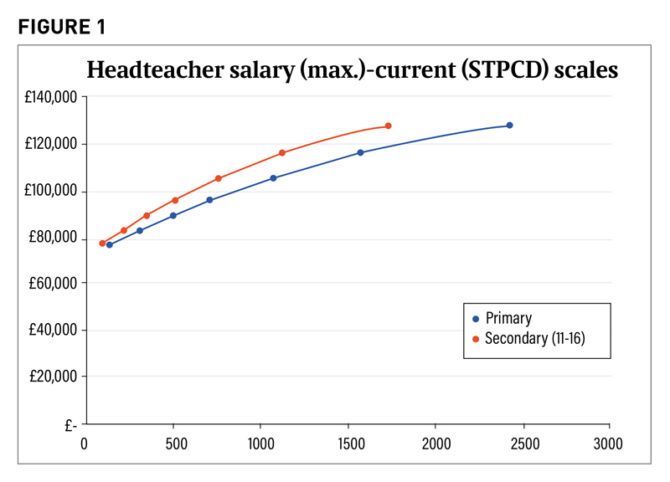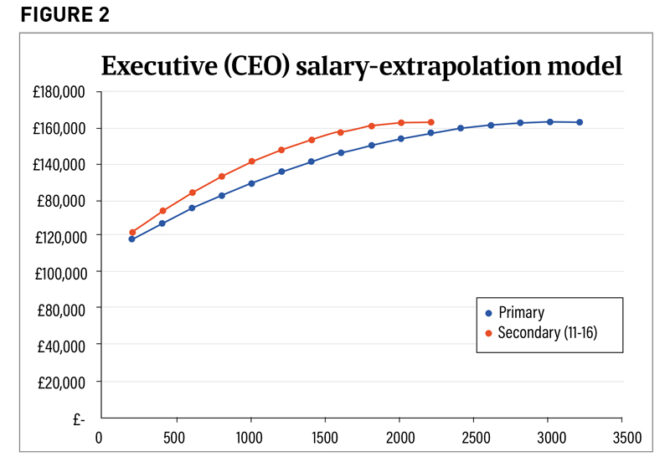Irrational. Indefensible. Unregulated. Every year, as predictable as Easter Eggs on shop shelves, the publication of trust CEO salaries elicits a springtide surge of protestations. But there is a solution for a minister bold enough to wade in.
The objections are clear and valid.
It is hard to square the startling disparities in salaries between otherwise comparable roles, even allowing for context or performance-related flexibilities.
It is equally difficult to justify such exaggerated levels of pay for taxpayer-funded public servants at a time of fiscal constraint and redundancies.
There are important accountability issues too. In the absence of publicly accessible benchmarking, pay levels may be determined behind closed doors without due diligence.
The challenge is compounded by insufficient distinction between job titles, role definitions and scope of responsibility. A headteacher may fulfil all the roles of head of school and CEO, or very much less, and a CEO could be working in a single- or a multi-academy trust (SAT or MAT).
This lack of clarity gives rise to another problem: the use of unsuitable proxy measures. Seeking an easy linear assumption, many revert to per-pupil or per-institution figures, both of which tell us little.
The per-institution measure is worse because schools vary highly in scope and size. The per-pupil measure, meanwhile, is a powerful tool to reveal disparities, but not a fair measure on which to award pay.
For all these reasons, we urgently need a national scale for executive pay. But what might that look like?
All it needs is one bold minister
An intelligent model would show a diminishing rate of salary increase with the scale of the provision, with an upper maximum limit.
Responsibility increases with ‘scale’, but so does the breadth of other senior staff taking on delegated responsibilities.
In other words, pay levels should not rise inexorably with scale. Increased scope of responsibility should carry an increased salary, but this ought to exhibit diminishing returns as against pupil numbers.
It is rarely highlighted in commentary on these issues that the leadership pay model in the school teachers’ pay and conditions document (STPCD) already exhibits precisely this kind of flattened curve. (See figure 1)

This model provides ample flexibility to adapt salary for context, improvement or sustained excellence through the selection of spine points. Employers also have a discretionary power to increase salary values by up to 25 per cent.
This approach could readily be extended for executive roles, building in an appropriate margin for headroom over headteacher pay. It would be relatively easy to adopt for trust CEO’s, for deputy CEO roles, for SAT CEO/headteachers and for those headteachers who have school-level responsibilities within a MAT or LA.
Enhancing the maximum spine point values in the STRB by 25 per cent and extrapolating the emergent curve, a model for executive salaries begins to emerge. The upper (asymptotic) limit for CEO pay then sits, theoretically, at around £175,000, extendable as required. (See figure 2)

There will be equally valid objections to this number, not least because the headteacher salary for the largest schools is already set at £138,000 (£165,000 including the potential uplift). At this level, maintaining an appropriate differential and internal relativities would be challenging.
One unpalatable solution would be to reposition headteachers in trust schools as ‘heads of school’, with lower salaries than headteachers in SATs or maintained schools.
Alternatively, a higher cap on executive pay could be justified where the CEO has an unusually broad remit, for example managing a ‘hub’ or a trading company selling central services.
Either way, there is certainly scope to develop a framework to sit alongside whatever salary progression methodology is chosen. It could even be standard across the sector and aligned to progress and performance in advancing the attributes of a strong trust.
The result would be an equitable, coherent, progressive and motivating approach to CEO pay that is also rational, defensible and amenable to open scrutiny.
And all it needs is one bold minister.








The solution is very simple. Force these so called gurus and pedagogic whizzes back into the classroom in frontline roles on mainscale pay. If they refuse, simply cancel their pensions. This will help solve the teaching recruitment and retention crisis as there are so many of these at the top not teaching a single lesson and they can practice what they preach. The mental health pressures on teachers will diminish significantly and staff will have a member of the staff in their department who claims to know Ofsted so well; they can deal with all the requirements for the department. Job done!